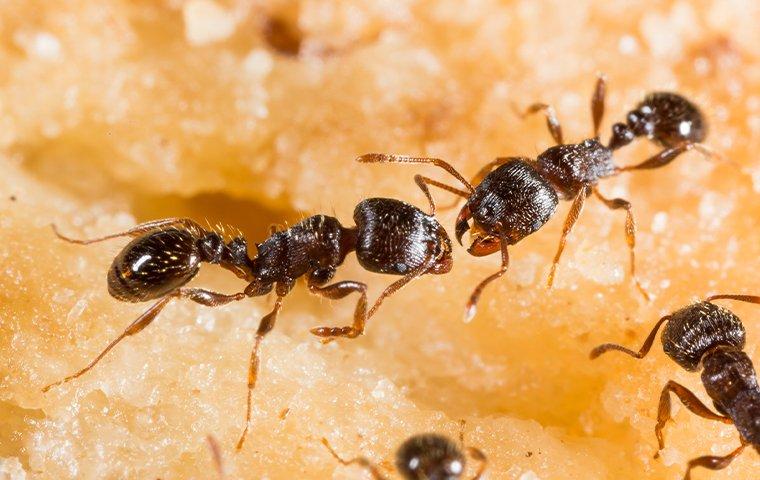ANT IDENTIFICATION & PREVENTION
(Formicidae)
FREE QUOTE
Request Your Free, No Obligation Quote
![]() Average rating of 5.0 out of 5 stars from 134 reviews. Read Google Reviews
Average rating of 5.0 out of 5 stars from 134 reviews. Read Google Reviews
What are ants?
Ants are social insects that live together in large groups and are lead by a queen. A colony of ants may have one or many queens, with their sole job to reproduce with the males and make more ants. New ants will develop into either new queens, males, or workers. Worker ants are sterile females that make up the bulk of the colony and complete the work that makes the colony thrive. Gathering food, defense, nest repair, and caring for developing ants are all done by worker ants.
Ants are very familiar to most of us and have three body segments, a defined waist, six legs, and short antennae. An ant's exact appearance, behavior, and nesting site preference will vary by species.

Some of the most common ants living throughout Tarrant County include:
- Fire ants
- Pavement ants
- Carpenter ants
- Crazy ants
- Little black ants
Are ants dangerous?
An ant that is considered dangerous causes harm to either people or our property. In our area of Texas, carpenter ants, fire ants, and crazy ants are considered dangerous ants.
- Carpenter ants are large ants that nest inside wood and, when in our yards, can nest inside our wooden structures, causing damage to them. Things like wooden play sets, fences, decks, and wooden borders surrounding garden beds can be invaded and damaged by carpenter ants.
- Fire ants are tiny, pesky ants that nest in yards and make it so people can't enjoy their outdoor spaces. These ants are easy to anger and defend themselves by delivering painful bites and stings. The venom they inject can trigger serious reactions in those allergic.
- Crazy ants move in an irregular or erratic pattern and are dangerous because they can invade electric equipment causing shorts and other damage. They also get into the eyes and ears of livestock and displace native species of ants.
- Pavement ants and little black ants aren't dangerous, but they also aren't wanted. These small black nuisance ants create unsightly nests in our yards that damage grass, are ugly to look at, and make mowing difficult.
Where will I find ants?
Our outdoor spaces offer ants multiple places to nest. Ants tend to pick similar nesting spots with some variations depending on the exact species:
- Carpenter ants build nests inside of wood, preferring wood that has been damaged by water like fallen trees, tree stumps, and old wooden structures.
- Fire ants create nests in open sunny areas, which is why our yards are so attractive to them.
- As their name hints, pavement ants nest in the exposed soil next to or in the cracks of sidewalks, driveways, and foundations. These ants are a common sight around our homes.
- Crazy ants nest outside in damp areas under mulch, rocks, leaf litter, woodpiles, and in tree cavities.
- Little black ants are common in or near wooded areas. When they make their way to our yards to nest, they nest under rocks, rotting logs, and under piles of bricks, rocks, or lumber.
How do I get rid of ants?
The best way to eliminate nuisance and dangerous ants from your yard is to consult with a professional. At Trees Hurt Too, Inc., we understand the damage and stress ants can cause and will work with you to eliminate them from your property. Using eco friendly products, our professionals will take back your yard from nesting and foraging ants.
We are a locally owned and operated company and understand the pest control needs of home and business owners located in Tarrant County, TX. To learn more about our ant control services, give us a call today, and speak with one of our helpful professionals!
How can I prevent ants in the future?
Limit the chances of your yard becoming a home to ants with the following prevention tips:
- Outdoor trash cans and recycling bins need tight-fitting lids on them to keep ants out.
- Place trash cans, recycling bins, and woodpiles away from the outside walls of your home.
- If pet food is stored outside, make sure it is in a hard-sided container with a locking lid.
- Make sure grill areas are free of food debris.
- Maintain gardens and compost areas.
- Seed bare spot in your lawn.
- Remove excess debris from your yard like fallen trees, tree stumps, brush, and old wooden fences where ants could nest.
Our Texas Service Area
LATEST BLOGS
Stay informed about pests and pest related issues in your area!
In the vivid tapestry of our gardens, trees stand as towering sentinels, offering shade, beauty, and life. Yet, these majestic […]
As the golden leaves of fall begin to blanket our gardens, signaling the end of another growing season, it’s essential […]
There’s nothing quite like the sight of a majestic tree adorning your landscape. But when those once-vibrant leaves start to […]




